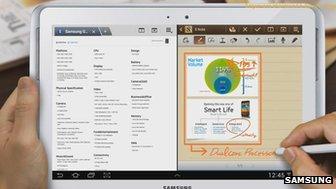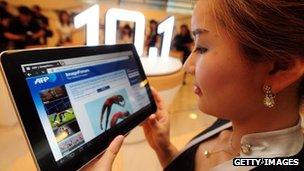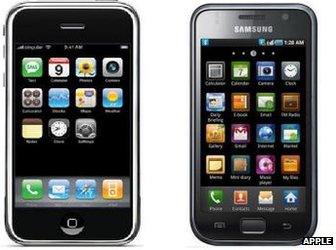Samsung Galaxy Note tablet launched mid-patent trial
- Published

The new tablet offers a split-screen mode in which two apps can be run simultaneously
Samsung has launched a new tablet, the Galaxy Note 10.1.
The release comes midway through a patent trial involving the South Korean firm and Apple, in which each company has accused the other of copying its technology.
The new Android tablet distinguishes itself from the iPad by featuring a stylus and a screen which can measure 24 levels of pressure sensitivity.
It also allows a split-screen mode in which two apps can be used at once.
In addition Samsung has opted to retain a look it introduced in 2011 placing wider bezels along two of the device's sides. The feature was created after a German court temporarily banned earlier models for infringing Apple's tablet design.

Apple claims that some users mistakenly bought Samsung tablets believing they were iPads
The significance of this is that Apple is seeking damages in the California trial claiming that its rival's original Galaxy Tab computers were "confusingly" similar to its own.
Samsung rejects the accusation saying Apple's US design patent showed "little more than a blank rectangle", and it would go against legal precedent to allow it to monopolise the shape.
The judge overseeing the case has asked the chief executives of both firms to meet again to see if they can resolve the dispute without the need for a court ruling.
According to analysts at IHS iSuppli, Apple had a 69.6% share of the global tablet market in the April-to-June quarter, compared with Samsung's 9.2% share.
Icon designs
The Asian tech firm began calling its witnesses at the trial in San Jose earlier this week after Apple rested its case.
Among them was Dr Woodward Yang, an electrical engineering professor from Harvard University, who backed Samsung's claim that Apple had infringed patents involving sending photos by email and playing music in the background.
Samsung also took evidence from Jeeyuen Wang, one of its designers, who rejected claims she had made reference to or copied the look of Apple's iOS system app icons.
Apple's lawyer then showed the court documents signed by Ms Wang which featured side-by-side comparisons of the two firms' interfaces.

Apple has suggested that several of Samsung's icons looked similar to its own designs
Samsung also presented video testimony from Rodger Fidler, a former employee at the Knight Ridder newspaper group, who developed a mock-up tablet for a concept video in 1994, external. He said he had shown the prototype to Apple.
The evidence is intended to suggest that Apple's designs were not unique and therefore do not deserve patent status.
Earlier this year a court in the Netherlands rejected a claim that an early Galaxy Tab computer had infringed Apple's design rights after hearing about the Knight Ridder effort.
Damages
Apple is claiming a total of $2.5bn (£1.6bn) in damages claiming seven patent breaches in addition to other trade violations.
The judge could triple that figure if she decides to punish Samsung for wilful misconduct.
For its part the South Korean company is demanding a "reasonable royalty rate" for five patents which it claims Apple has infringed.
Both sides are expected to present closing arguments next week.
However, Judge Lucy Koh has convinced the firms to make one last effort to resolve the lawsuit outside court.
"I see risk here for both sides if we go to a verdict," the judge said according to a transcript provided by Forbes magazine, external.
"I think it's worth one more attempt. If you could have your CEOs have one last conversation, I'd appreciate it."
Lawyers for the companies said at the very least there would be a telephone conversation involving the businesses.
- Published8 March 2012
- Published3 August 2012
- Published30 July 2012